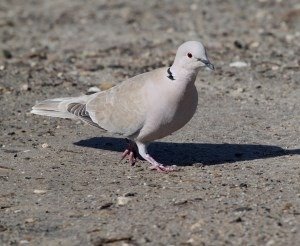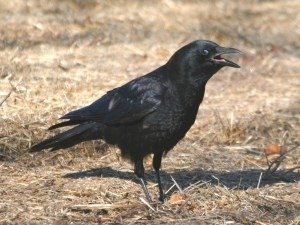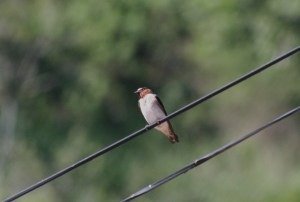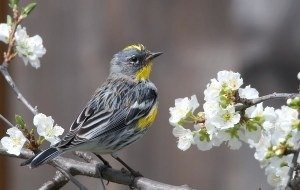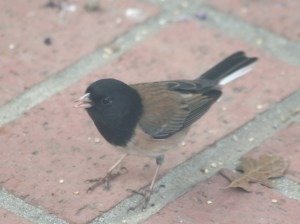
birds
Birdwatcher’s guide on
OUR PRESERVES
This Ojai Meadows Preserve guide contains native birds of this region. Download a pdf of this guide and save to your phone for quick access and use when you are out of service.
eBird also provides an excellent source of info on birds of the region.
-
Anas platyrhynchos
Male—metallic green head & neck, yellow bill, narrow white collar, chestnut breast.
Female—mottled plumage, orange bill marked with black
-
Callipepla californica
Gray & brown above, with prominent teardrop‐ shaped plume or double plume. Scaled underparts & brown sides & crown. Body color varies from grayish to brown.
Male has pale forehead, black throat & chestnut patch on belly.
-
Ardea herodias
Gray‐blue; black stripe extends above eye; white fore‐ neck is streaked with black. Adult has yellowish bill.
-
Ardea alba
Large, white with heavy yellow bill, black legs & feet.
-
Cathartes aura
Adult has red head, white bill, brown legs. In flight, wings held upward in a shallow V.
-
Buteo jamaicensis
In flight, wings broad & fairly rounded, squared tail, upper tail is red with black terminal band, under tail is tail
Underparts, pale with dark belly band; back pattern spotted or speckled.
-
Falco sparverius
Russet back & tail, double black stripes on white face.
In flight, adult shows pale underwing, male has distinc‐ tive row of white, circular spots on trailing edge of wings.
-
Fulica americana
Overall blackish; outer undertail coverts white. Whitish bill has dark subterminal band; legs yellow.
-
Charadrius vociferus
Double breast bands. Reddish orange rump is visible in flight.
-
Patagioenas fasciata
Purplish head & breast; dark‐tipped yellow bill, yellow legs; broad gray tail band on longish tail; narrow white band on nape.
-
Zenaida macroura
Long tail tapers to a point. Black spots on upperwing; pinkish wash below.
In flight, shows white tips on outer tail feathers.
-
Streptopelia decaocto
Slightly larger than Mourning Dove. Very pale gray‐buff; black collar.
-
Bubo virginianus
Bulky body shape; white throat; distinctive ear tufts.
-
Calypte anna
Adult male’s head & throat are deep rose red, ex‐ tending a short distance onto sides of neck.
Female’s throat usually shows red flecks, often forming a patch of color.
Both sexes, underparts are grayish, washed with a varying amount of green. Bill is shorter.
-
Melanerpes formicivorus
Black chin, yellowish throat, white cheeks & fore‐ head, red cap.
Male, black bar on forecrown.
In flight, white rump & small white patches on outer wings.
-
Picoides nuttallii
Underparts, white with black spotting; upperparts, black; head pattern, capped, striped, unique pattern, malar or malar stripe; cap is red, gray; forehead is black; nape is red; throat is white.
In flight, notched tail.
-
Sayornis nigricans
Black head, upperparts & breast; white belly & undertail coverts.
-
Sayornis saya
Grayish brown above, darkest on heads, wings & tail; breast & throat pale grayish brown; belly & undertail converts tawny.
-
Tytannus vociferans
Dark brown tail; narrow buffy tips & lack of white edges on out‐ er tail feathers distinguish from Western Kingbird. Upperparts darker gray than Western, washed with olive on back; paler wings contrast with darker back. White chin contrasts with dark gray head & breast. Belly dull yellow.
-
Tyrannus verticalis
Black tail, with white edges on outer feathers. Upperparts ashy gray, paler than Cassin’s tinged with olive on back; dark wings contrast with paler back. Throast & breast pale gray; belly bright lemon yellow.
-
Aphelocoma californica
Long tail; blue above; contrasting brown patch; distinct white eye brow & blue breast band.
-
Corvus brachyrhynchos
Long, heavy bill, smaller than ravens. Fan‐shaped tail distinguishes all crows from ravens in flight.
-
Corvus corax
Long, wedge‐shaped tail in flight.
-
Petrochelidon pyrrhonota
Squarish tail & buffy rump. Most have dark chestnut & blackish throat, pale forehead,
-
Baeolophus inornatus
Grayish brown with a short crest.
-
Psaltriparus minimus
Very small & long tailed, gray above, paler below; Female has paler eyes, male’s eyes are darker. Coastal birds have brown crown; interior birds show brown ear patch & gray cap.
-
Troglodytes aedon
Primary color is brown; underparts are pale gray; upperparts, brown; back pattern, barred or band‐ ed; belly pattern, solid; crown color is tan; fore‐ head & nape, gray‐brown; throat is white.
In flight, rounded tail, tail is brown with narrow black barring.
-
Sialia mexicana
Male’s upperparts & throat are deep purple‐blue; breast, sides & flanks chestnut; belly & undertail coverts grayish. Most birds show some chestnut on shoulders & upper back.
Female duller, brownish gray above; breast & flanks tinged with chestnut, throat pale gray.
-
Mimus polyglottos
In flight, white outer tail feathers & white wing patches.
-
Sturnus vulgaris
Adult in breeding plumage is iridescent black, w/ a yellow bill w/ blue base in male, pink in female. In fall plumage, feathers are tipped w/ white & buff, giving a speckled appearance; bill brownish. In flight, note short, square tail, stocky body & short, broad‐based, pointed wings that appear pale gray from below.
-
Setophaga coronata
Yellow rump, yellow patch on side, yellow crown patch, white tail patches. Western birds, have yellow throat.
-
Geothlypis trichas
Adult male’s broad black mask is bordered above by gray or white, below by bright yellow throat & breast; undertail converts yellow.
Female lacks black mask; has whitish eye ring.
-
Melozone crissalis
Brownish overall; slightly warmer brown than rest of upperparts. Buff throat is bordered by a distinct broken ring of dark brown spots. Lores are same color as throat & contrast with cheek; undertail coverts warm cinnamon.
-
Melospiza melodia
All subspecies have long, rounded tail, pumped in flight. All show broad grayish eye brow & broad, dark malar stripe bordering whitish throat. Upperparts are usually streaked. Under‐ parts whitish, with streaking on sides & breast that often converges in a central spot.
-
Zonotrichia leucophrys
Black & white striped crown; pink, orange or yellowish bill; whitish throat; underparts mostly gray.
-
Junco hyemalis
Variable. Most subspecies with gray or brown head & breast.
In flight, white outer tail feathers.
-
Sturnella neglecta
Black V‐shaped breast band on yellow under‐ parts but in spring & summer yellow extends well into the submoustachial area, especially in males; yellow often veiled in fall.
-
Agelaius phoeniceus
Glossy black male has red shoulder patches broadly tipped with buffy yellow.
Females are dark brown above, heavily streaked below; sometimes show a red tinge on wing cov‐ erts or pinkish wash on chin & throat.
-
Euphagus cyanocephalus
Male has yellow eyes. Black overall with purplish gloss on head & neck, greenish gloss on body & wings.
Female’s eyes are usually brown.
-
Quiscalus mexicanus
A large grackle with very long, keel‐shaped tail & golden yellow eyes. Adult male is iridescent black with purple sheen on head, back & under‐ parts. Adult female’s upperparts are brown; un‐ derparts cinnamon‐buff on breast to grayish brown on belly; shows less iridescence than male.
-
Molothrus ater
Male’s brown head contrasts with metallic green‐black body.
Female is gray‐brown above, paler below.
-
Carpodacus mexicanus
Male has brown cap; front of head, bib, & rump are typically red but can vary to orange or occasionally yellow. Bib is clearly set off from streaked underparts. Tail is squarish.
Adult female are streaked with brown overall.
-
Spinus tristis
Breeding adult male is bright yellow w/ black cap; black wings have white bars, yellow shoulder patch; tail is black & white. Female is duller overall, olive above; lacks black cap & yellow shoulder patch. White undertail cov‐ erts distinguish female from Lesser Goldfinches. Winter adults are either brownish or grayish above; bill darker. Male may show some black on forehead.
-
Spinus psaltria
Smaller than American Goldfinch. All birds have a white wing patch at base of primaries. Entire crown black on adult male; back varies from black in eastern part of range to greenish in western birds. Most adult females are dull yellow below.
-
Geococcyx californianus
The Greater Roadrunner (Geococcyx californianus) is a large, ground-dwelling bird found in the deserts and scrublands of the southwestern United States and Mexico. It has a distinctive appearance with a long tail, strong legs, and a shaggy crest. Its plumage is mottled brown and white, providing excellent camouflage in arid environments. The bird has a long, slightly curved bill and an expressive bare patch of skin behind the eye that can flash blue and red when excited. Despite being capable of flight, it spends most of its time on the ground, where it can run at speeds up to 20 miles per hour. The Greater Roadrunner is an opportunistic predator, feeding on insects, lizards, snakes, small mammals, and even other birds.












